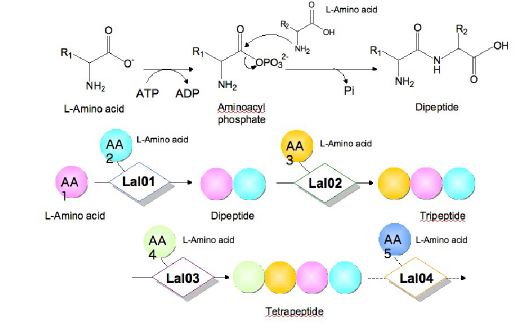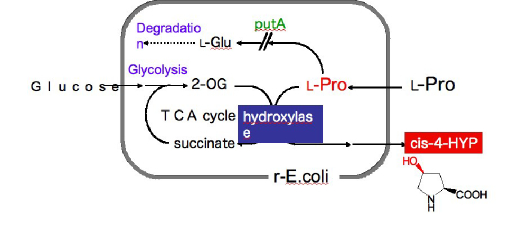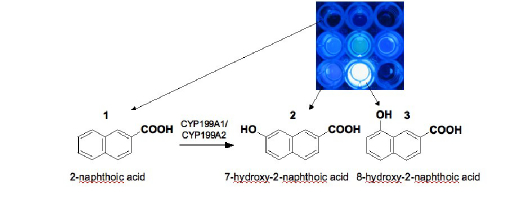 Open Nav
Open Nav
 Open Nav
Open Nav
Research and development on the application of unique and diverse microbial functions to industrial processes is important. From this viewpoint, we investigate methods of screening and designing enzymes and breeding microorganisms. Based on these innovations, we develop novel environmentally friendly production systems for biologically and chemically useful compounds, such as pharmaceuticals and commodity chemicals.
Based on information of protein structures, we have discovered novel L-amino acid ligases by investigating vast microbial genomes. Enzyme screening focused on the facility of microorganisms has led us, moreover, to obtain unique L-amino acid ligases that were not found through genome information. We have been screening enzymes by these methods and investigating effective processes of peptide production using various L-amino acid ligases with unique reactivity and specificity.
Amino acid derivatives are expected as intermediates for pharmaceuticals and agrochemicals, and we are investigating practical production processes. We have constructed a library of aminotransferases with different enzyme characteristics. Using this library, we have achieved selective synthesis of unnatural amino acids. We have also studied and characterized various monooxygenases such as cytochrome P450 and dioxygenases. We have discovered novel hydroxylases acting on basic, aliphatic, aromatic amino acids and proline in a regio- and stereo-selective manner. Using these hydroxylases, we have developed an effective production process for cis-4-hydroxy proline (an antitumor agent) and 4-hydroxy isoleucine (a therapeutic agent for type-II diabetes).
Use of biomass is an important issue for construction of a sustainable society. So far, we have focused on woody biomass, which does not compete against food, and we have developed a fermentative process for ethanol and lactic acid. The necessity of microorganisms that ferment not only C6 sugar but also C5 sugar has emerged for further utilization of woody biomass. We are consequently investigating the breeding of high-performance yeas by recombinant DNA and breeding technologies to ethanol fermenting yeast. We are also proceeding, moreover, with screening and breeding of cellulase-producing microorganisms for effective saccharification. Besides these, we are investigating the construction of novel bioprocesses for commodity chemicals and the development of high-functioning biomolecules such as bio-based polymers.

Fig. 1 Scheme of peptide synthesis using L-amino acid ligases

Fig. 2 Production of cis-4-HYP by r-E.coli resting cells.

Fig. 3 Biocatalytic oxidation of 2-naphthoic acid by P450 and optical properties under 302 nm UV light.
B.S. Waseda University (1979); Ms. Engineering, Waseda University (1981); Kyowa Hakko Kogyo Co.Ltd.,(1981-1999); Dr. Engineering, Waseda University (1987); Professor, Waseda University (1999-); Senior Fellow, Japan Science and Technology Agency, Center for Research and Development Strategy (2005-2008); Special Visiting Fellow, Kazusa DNA Research Institute (2006-); President, The Society for Biotechnology Japan, Eastern Japan Branch (2003-2006); Executive Director, The Society for Biotechnology Japan (2007-); Council Member, Japan Society for Bioscience, Biotechnology, and Agrochemistry (2009-). Excellent Paper Award of the Society for Biotechnology, Japan (2008).